“I wasn’t necessarily trying to kill anybody, I just wanted to let them know I existed.”
New York’s Blush Response has come a long way in a short while. From the fun but comparatively traditional EBM/industrial feel of 2010’s We Are Replicants, Joey Blush has quickly expanded his profile to take on a wide range of sounds, new and old, abrasive and approachable. We got in touch with Blush to discuss gear, sound design, and his hopes for the burgeoning project.
ID:UD: Tension Strategies struck us as a big step forward for the project, both technically and from a songwriting perspective. Do those two elements inform one another? Does honing studiocraft influence how you approach writing, or vice versa?
Joey Blush: With every release I make, I always try to up my own personal standard for what music should be. I spent a lot of time honing every aspect of my production whilst writing this album. To me, production and writing are one and the same. Good songs deserve good production – it’s easy to write a track, stick a few sounds on it, use some standard sounds and some nice strings to get the feel out, but you’re not going to wow anybody. You need to have your production just as tight, if not tighter than the song itself. I want to do something that really shines in both area. I want to create albums that blow people’s heads off in the same way the albums that inspired me to create did to me. I don’t want to create something that sounds nice but isn’t really killing it in any one area.
ID:UD: There’s a lot of structurally unconventional material on the album. Where we felt that We Are Replicants was rooted in more straightforward EBM tradition, the tracks on “Tension Strategies” go off in a lot of different directions stylistically. How conscious were you of the change, and what factors led to it creatively?
JB: We Are Replicants was my attempt to prove to myself that I could write and produce an album without the help of others. It definitely is more straightforward in terms of sound – and that again is because of the nature of its intent. I wasn’t necessarily trying to kill anybody, I just wanted to let them know I existed.
Tension Strategies was a conscious decision to completely change the sound. I wanted to create something experimental and unforgiving, and I didn’t want to repeat myself. The threads of industrial are definitely in my songs, but I don’t want to confine myself to any one genre. I am an electronic musician, not an industrial musician. For whatever the third release ends up being, I will again try to change the sound. I am in music to create something original and true to myself, something that draws a picture of what I want music to be – not something rooted in a retro rulebook. I love industrial music, and it captures the same darkness that I’ve been drawn to my entire life, but I don’t want to repeat what has been done already. I want to create the new.
ID:UD: Does not wanting to pigeon-holed as an industrial artist also extend to not wanting to limit your audience in any way?
JB: Absolutely. Part of wanting to create music means wanting to share it with literally everybody. I’ll play to anyone, and I hope they like it. The more the better. With that in mind, I am not out to create music for it to be palatable to others. I would not compromise my ideals to create something that would possibly drive more sales. It is my opinion that stuff done for that is easy to see through, and often backfires for being too “safe”. Music made for that purpose often becomes forgettable – I am not in it for that.
ID:UD: We’re interested in your studio, specifically in your use of modular synthesis in your music. It certainly seems like the sound of the record is shaped by the use of modular synths: do you find working with them (as opposed to a purely digital solution) to be creatively inspiring?
JB: My music is about as computer heavy as it is modular heavy. I write in two phases – the initial songwriting/sound experimentation phase, and then the editing phase. Though 95% of the sounds on the record come from my hardware setup (modular and various other synths), just as much goes into post production and editing that. I am not a purist when it comes to sound, I think that’s a bit silly and limiting. Certain parts of the record could have started in the modular, been edited and effected with some plugins, then sent back out to the modular or another fx unit for further processing. When you think of sound in terms like that, the whole idea of “analog vs digital” becomes silly. Is a sound that has gone through that much analog or digital anymore? Does it really matter? I try not to worry.
With that in mind, the approach implied by a modular synth is something that resonates with me in a huge way. To me, modular synths are the only kind of synths that give you the level of expression you can find in other instruments like a guitar. Keyboard synths seem a bit archaic to me – their control method feels stymied by bad interface (black and white keys). I’ve recently been looking into getting some sort of alternative control surface like a Haken Continuum or Buchla 222e, but that’s really a matter of budget. I’m after direct interaction with sound, and modular definitely gives me that. The nature of my music involves a lot of editing – but I honestly wish I didn’t have to do it. The future to me would be to be able to do all of the crazy shit I do on recording but completely within the hardware realm, so that my computer could serve as more of a glorified tape recorder.
ID:UD: It’s interesting to see a lot of artists consciously moving away from the computer. It’s obviously been instrumental in giving artists DIY production opportunities, but it also feels like there’s a growing sentiment that it can be just as creatively limiting as it is liberating. Do you see a point where the DAW becomes less ubiquitous?
JB: I think computers are a necessary part of recording and production today, and always will be. The convenience and flexibility contained within DAWs just simply outclasses any other type of recording method. The hard part is to not overtweak. The music has to remain real and human. There are right and wrong ways to do things. When the computer is a crutch for your lack of ability, it’s a problem. But, at the same time, I don’t think that it is necessary to “play an instrument” to create music. The computer can be just as much of an instrument. With that in mind, I am a fan of hardware for it’s tweakability. I like getting physical with my instruments, and the current state of computer software doesn’t allow a real convenient physicality. I imagine it will get there one day, and when it does, I’ll probably use it. It may probably sound just as good as real analog hardware at some point as well. And that’s okay with me.
“Those sounds were previously confined to EBM, but eventually they became less ‘strange’, and the collective consciousness allowed them into the Top 40.”
ID:UD: Sound design is sort of mysterious to us as non-musicians, the idea that you aren’t just writing the music, but actually designing the instruments in a manner of speaking. Can you speak to how you approach that tradition, and how you approach integrating design with songwriting?
JB: The thing that resonates most with me in a lot of music is the sounds. For many years I never read lyrics, because I never cared what the songs were about, I just cared about the raw emotion contained within the sounds and the vocalizations. Quite a few songs I used to love have been ruined for me by reading the lyrics. All the great sounds and chord progressions ruined by silliness. With that in mind, I still believe one needs to write something effective. Music is a statement, both sound wise and lyric wise.
Sound design, for me, is a natural extension of music. It is my belief that sound design has always been the unspoken focus of most of the music we listen to. When you take an album like Bowie’s Low, for example, and you listen to the drums, they sound kind of weird. Upon further inspection, you can read the story of how the drums were ran through one of the first Eventide Harmonizers. The producer, Tony Visconti, would have other producers try and guess how he made them sound the way they did, but he never really gave it away. That is sound design.
Music evolves at the rate technology evolves. As time goes by, our ears become used to more esoteric sounds, and they become a natural part of all music. That is why you hear stuff like hypersaw sounds in Top 40 pop music. Those sounds were previously confined to late 90s/early 00s EBM, but eventually they became less “strange”, and the collective consciousness allowed them into the Top 40.
This same reason is also why the drums on that Bowie record may not totally sound strange now – we’ve heard weird pitch shifted drums for years now because of that record – and this reason is also why synthesizers are so prevalent in music right now – it’s easy to get your hands on them and make something cheaply, on your own, and have it out within a few hours.
With all this in mind, I try to create with the sound in mind first. What inspires me most is creating things I haven’t heard before, but that are also effective as songs. You can be totally weird for weirdness’ sake, but at the end of the day, you still have to get people to pay attention. So I try my best to create interesting sounds that can be wrapped around the idea of a song. Part of this revolves around designing my own instrument to have as many possible conclusions in sound as I want.
To illustrate this more – when you make a patch on a modular synth, you create a signal path that has a certain number of parameters. You can have a million possibilities with this one configuration, then you can tear it all down, create a new patch, and suddenly have a million totally different possibilities. This type of flexibility is simply not found in hardware synths, and that’s why I chose the modular as my main instrument – it represents the future to me. A completely open environment for creating raw and new sound.
ID:UD: Building on the normalization of “weird” sounds, and seeing yourself as an electronic musician first and foremost, are you finding any inspiration in newer, more mainstream electronic sources?
JB: That’s hard to say because I live in my own world musically. I’ve never heard a lot of music that’s on the radio, not out of some impetus to be holier than that, but rather just because I don’t really listen to it. I am a fan of all music, and feel that you can learn something from anything you hear. But I don’t really know what “mainstream” means, outside of the obvious Top 40. I listen to what I like, and don’t worry about where it fits in.
If I had to pick some artists with releases I’m really into at the moment, I’d say Death Grips, Autechre, How to Destroy Angels, Hecq, Perc, Tommy Four Seven, Richard Devine, Demdike Stare, and Jimmy Edgar. These are just some… I listen to a lot of music all the time, though I’m often pretty late in terms of keeping up with “new” releases.
“The power still remains in the artists hands, but, at least in my case, I want to be an artist to be an artist. “
ID:UD: The new record is being released digitally by Tundra Dubs in the US, and on CD and digitally by Basic Unit Productions in Europe and Russia. How do you perceive the role of each label in the promotion and distribution of the record, and where do you stand with regards to working with a label vs. doing it yourself in the current climate?
JB: For a short while it seemed that everybody was championing the death of record labels and the ability for artists to promote themselves without giving all their money to the corrupt corporate overlords. This idea is still around today – but I don’t think it’s totally relevant. The power still remains in the artists hands, but, at least in my case, I want to be an artist to be an artist. I don’t necessarily want to have to deal with figuring out the best places to send my record, having to make a list of blogs to hit about my release, make a one sheet, and hope to not get ignored. I’d like to be able to create the art and let it speak for itself. Having a record label is like having a support system. On one end it shows that your music is “good enough” that somebody has decided to put it out. A lot of artists can be making great things, but if they are the only one saying they are great, people are less willing to listen. When you have a record label, like it or not, you are taken a bit more seriously (in my opinion).
I am very happy I teamed up with both Tundra and Basic Unit – both are a dream to work with, and I have been a fan of their respective catalogues for a while now (obviously Haujobb!). Tundra has a great reputation here in the US, and I’m really glad that I was able to get signed with them. At the same time, it seems the guys at Basic Unit understand the European market and have the reputation to make a mark in it, so going with them seemed natural. It takes some of the weight off my shoulders so I can focus on making the best songs I possibly can, without worrying about other shit.
Tension Strategies is available now via Tundra in North America, and Basic Unit Productions in Europe.

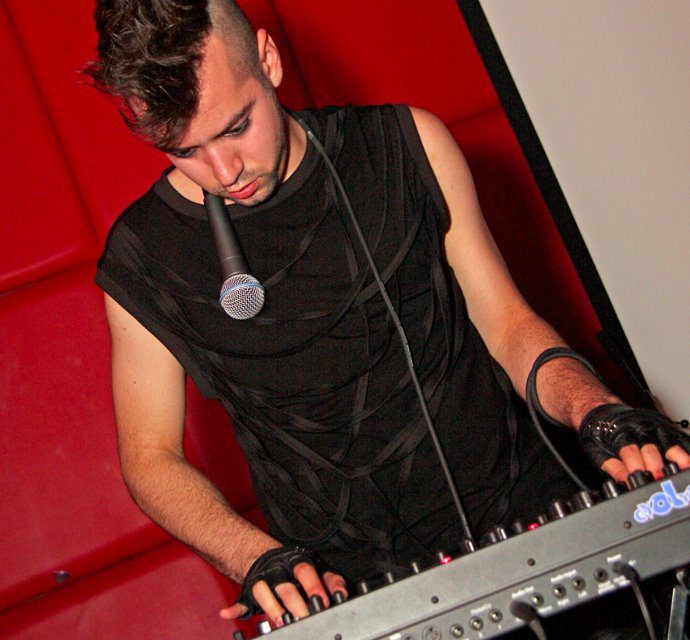
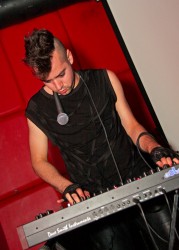
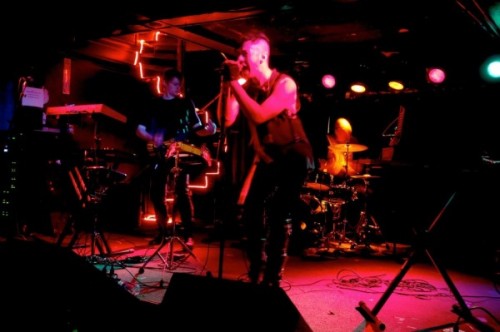
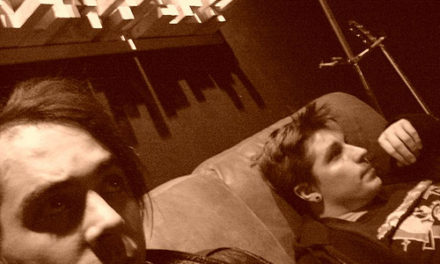
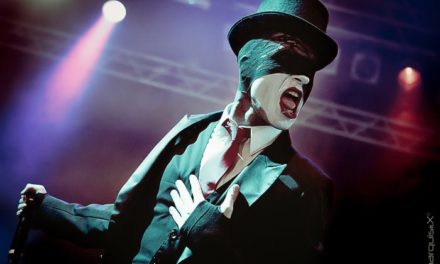

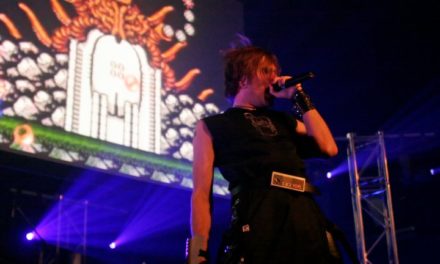
Trackbacks/Pingbacks